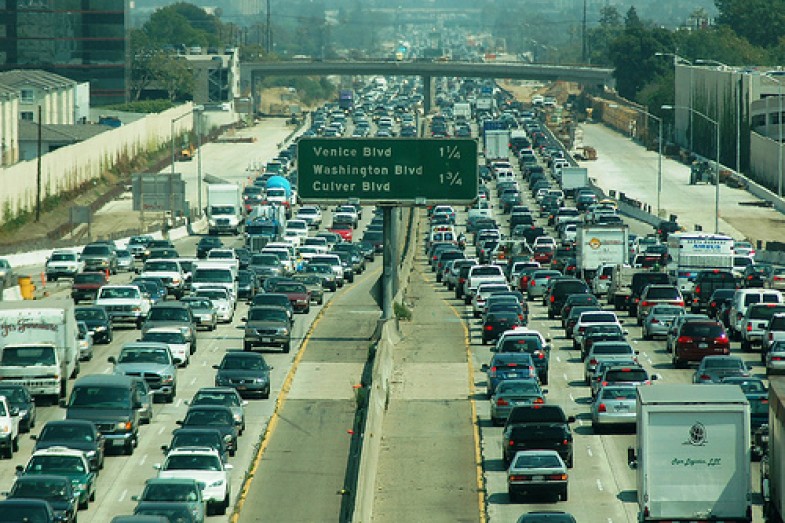The automobile has long been celebrated as a preeminent symbol of individual freedom. Whenever a politician or citizen group calls for redirecting our tax monies toward public transit, inter-city trains, walkable communities, bike lanes, and so forth, the automobile and highway lobbies sneer that such choices are “politically motivated” and threatening to our “freedom.”
Moreover, the lobbies say, spending more money on transportation alternatives would betray a long-time “social compact” that federal and state gas taxes be earmarked for highway construction and improvements. Gas taxes make roads and highways self-funding, the argument goes. This deeply entrenched – and erroneous – mythology has long prevented a re-thinking of how Americans should finance transportation and of the more ecological, socially attractive alternatives.
We should welcome, therefore, a recent report by the U.S. PIRG Education Fund, Do Roads Pay for Themselves? Setting the Record Straight on Transportation Funding . The report takes on what it calls the Great Myth of Highway Finance, the idea that gas taxes are a dedicated, self-sustaining source of funds for road-building. Since drivers pay for the gas tax, there is the assumption that there is no public subsidy from taxpayers for roads and bridges. It is only “fair,” therefore, that all gas tax revenues go exclusively to auto- and highway-specific needs. Highways are self-funding through “user fees,” goes the argument. Let other transportation modes make it on their own, too!
The authors of the PIRG report – Tony Dutzik, Benjamin Davis and Phineas Baxandall — set out to demolish this mythology, “with the hope that by doing so, America can get on with the critical debate about what types of transportation infrastructure to build and how to pay for them, free from false assumptions and tired slogans of the past.”
The report starts by noting that the gasoline tax is not a user fee. First, the correlation between gasoline usage and highway usage is rather loose; drivers are not making an extra expenditure for “something extra,” which is how most user fees work. When people pay for a marriage license or admission to a state campground, they are getting an individual benefit over an above what they pay in taxes.
But that’s not true with the gas tax. State gas taxes are usually a substitute for state sales taxes for fuel purchases, and so the money that would otherwise go into the general treasury instead goes into a separate fund to benefit drivers alone. Sounds like a subsidy to me!
If highways were truly financed through user fees, the payment would be for some specific, direct benefit for the paying driver…..like a toll. But tolling has never generated enough revenue to pay the actual costs of building and maintaining highway infrastructure. The tolls would have to be so high that people would be deterred from actually driving on the highways.
There’s a reason that the highway and automobile lobbies have propagated the myth about gas taxes as a “user fee.” It helps them “secure access to scarce government revenue for their desired public policy ends – distorting transportation decision-making,” the report notes. By making highways appear self-supporting and subsidy-free, the mythology makes it appear that public transit and other options are financially impractical and politically suspect.
Yet highways themselves require all sorts of government expenditures, over and beyond the gas tax. Drivers are not paying the full costs of that mode of transportation. But in addition, automobiles impose all sorts of economic, environmental and social costs onto others, in the form of air pollution, dependence on imported fossil fuels, carbon emissions into the atmosphere, suburban sprawl, barriers to transportation to the elderly, the disabled and children, and so on.
Interestingly, the PIRG report notes that the younger generation are less inclined to see the automobile as a symbol of personal freedom. Citing an analysis of real-estate trends by a Canadian consulting firm, the report notes:
“There is also growing research that younger generations do not relate to the automobile as enabling ‘freedom.’ Instead, their electronic and social media devices – whether a smart phone, small laptop computer, music player, etc. – provide an alternative means for self-expression and being free to do what they want…. Younger generations seem to have less interest in automotive use, making apartment living in dense, walkable and transit-oriented urban areas a more natural fit for their lifestyles.”
The PIRG report is a welcome debunking of the idea that automobiles and highways are somehow a “natural” birthright that would be un-American to move away from. As the report puts it, “The decision to pursue policies that maximize the volume of distances traveled – without the consideration of other social contexts and imperatives – is itself an exercise in social policy.”
David Bollier thinks and writes about the commons at www.Bollier.org , where this post originally appeared under a Creative Commons Attribution license. Bollier’s commons activism is focused on “The Commons Law Project and the Commons Strategy Group”:www.commonsstrategies.org






